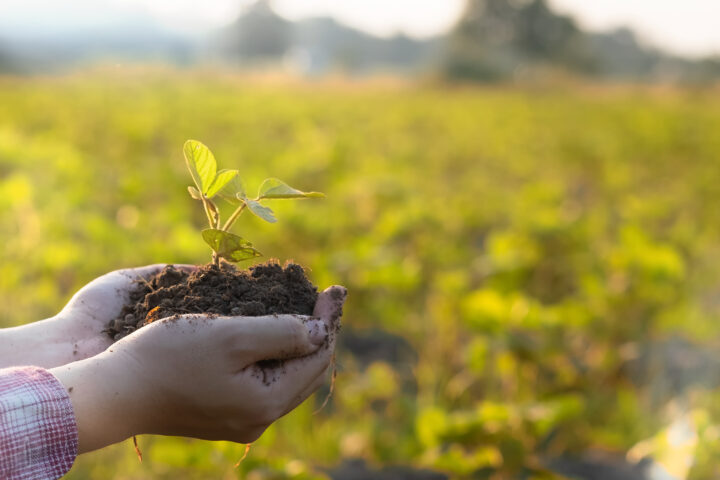
False paths in climate protection
Under the title “The Great Redistribution”, Beat Gygi vividly explored, in a conversation with Professor Philipp Aerni in Weltwoche, the pitfalls of the COP29 climate conference in Baku in 2024. According to COP29, transfer payments to countries in the Global South are to be increased, yet economic considerations and efficiency play only a minor role. The NGO-dominated UN conference fails to think of sustainability in a comprehensive way. Instead of relying on innovation, much remains bogged down in interest-driven politics. This is particularly true in Europe, especially in agricultural policy.
Friday, January 3, 2025
The two-week UN climate conference COP29 in Baku at the end of 2024 revolved mainly around a financial fund. Transfer payments to countries in the Global South are to be tripled. Professor Philipp Aerni provides context in a conversation with Weltwoche. Aerni is Director of the Center for Corporate Responsibility and Sustainability at the School of Management Fribourg. For years, he has taken a critical look at agricultural and development policy. His conclusion: Europe often hinders comprehensive sustainability. In agriculture in particular, he sees serious misaligned incentives and a tendency toward protectionism.
Aerni criticizes the fact that European states heavily subsidize their agricultural production. This leads to distortions in world markets. At the same time, countries in Africa and Asia are disadvantaged because their products are hardly competitive. Subsidies and import tariffs make goods more expensive or prevent them from entering European markets in the first place. This creates a vicious cycle: developing regions cannot benefit from international trade, invest less in the expansion of their agriculture, and remain dependent on external aid.
Central to Aerni’s argument is that the concept of “sustainability” is defined too narrowly. In Europe, the focus is heavily on ecological aspects, especially environmental protection. High standards and organic labels are promoted, which sound good locally but ignore global effects. Those who look only at regional ecology forget the social and economic dimensions. Aerni sees here a one-sided policy that is not holistic enough. In particular, the EU sets restrictive rules for crop protection, genetic engineering, and cultivation methods, often without considering the actual impact on climate, yields, and global food security.
One example, according to Aerni, are the debates about organic farming and genetic engineering. Many countries in Africa could increase yields and make their agriculture more efficient with the help of modern technologies. But European skepticism holds back innovation. Advances in agrochemistry or genetic improvements are often rejected out of hand. For Aerni, this is a luxury problem of the wealthy world.
In developing regions, the focus is on food security and poverty reduction. New varieties could withstand droughts better, deliver higher yields, and require less crop protection. An unproductive, extensive agriculture in Europe leads to a higher land demand in other countries. Aerni therefore calls for openness toward innovation—under clear safety standards, but without blanket prohibitions.
More concretely, the economist criticizes EU agricultural policy. It supports a small number of sometimes inefficient farms, cements existing structures, and makes market access more difficult for non-European actors. The consequence: small farmers in developing countries remain dependent on development aid, while Europe produces surpluses that flood the market. As a result, local producers lose competitiveness. According to Aerni, this contradicts the idea of global justice and long-term environmental protection. He refers to studies showing that freer markets and targeted technology transfer could reduce poverty and increase food security.
A wisely regulated agriculture, open to technology, could operate more efficiently. This would conserve land resources, reduce CO₂ emissions, and at the same time contribute to food security. It is essential, he argues, that Europe align its agricultural policy more closely with global criteria. Today, by contrast, symbolic politics often dominate. This may be popular but undermines the goals of genuine sustainability.
Aerni’s appeal to policymakers is: more openness, more dialogue, more scientific evidence. Food security, climate protection, and poverty reduction are closely interconnected. Rich countries must not measure themselves only by their own standards but must also consider their impact on world markets. Sustainable development can only succeed if Europe is willing to dismantle its protectionist barriers and allow innovation. He sees in this an opportunity to integrate the Global South into a fairer agricultural system. At the same time, he emphasizes, European consumers would also benefit from more competition, lower prices, and an innovative agricultural and food sector.
Kindly note:
We, a non-native editorial team value clear and faultless communication. At times we have to prioritize speed over perfection, utilizing tools, that are still learning.
We are deeply sorry for any observed stylistic or spelling errors.
Related articles

Lack of diversity becomes an existential problem
The dwindling genetic diversity in fields is becoming an increasing problem. Unfortunately, this problem is growing steadily, partly because politicians in Switzerland and the EU are viewing the issue through ideological lenses instead of listening to science.

Research into fungal diseases in Lyon
Fungal diseases are one of the greatest threats to global food production. They endanger crops, cause billions in damage every year and have always put farmers under pressure. A detailed report by RTS provides insights into Bayer's global research and development centre in Lyon, where new, environmentally compatible fungicides are being researched.

Science sounds the alarm: Federal Council draft slows down innovation
The new genomic breeding methods are regarded worldwide as a source of hope for climate-resilient agriculture – precise, efficient, and safe. While countries such as the US, Japan, and soon the EU are pushing for deregulation, the Federal Council's regulatory proposal remains tentative. Now researchers and industry are sounding the alarm: the proposed rules are so strict that they would effectively block innovation and application.

Approvals are becoming a brake on innovation worldwide – and agriculture is being left behind
New findings from the United States highlight what has long been a reality in Europe and Switzerland as well: the development and approval of new crop protection products has become such a complex, lengthy, and costly process that even innovative, sustainable solutions can hardly reach the market anymore.

